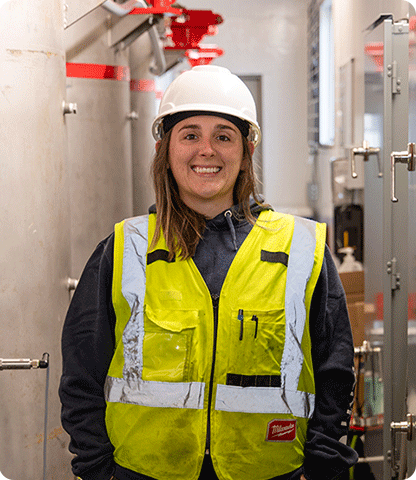Deep Tech, Big Impact: How Wisconsin’s Ecosystem is Fueling Scientific Innovation

Paige Peters, Founder of Rapid Radicals
Column by Paige Peters, Founder and Chief Technology Officer, Rapid Radicals
This September, I attended Climate Week in New York City for the first time which is a global gathering of innovators, policymakers, and problem-solvers all working toward a more sustainable future. It was incredible to be surrounded by so many people focused on the same mission: solving some of the biggest challenges facing our planet.
I was there as part of the Activate Fellowship, a program that supports deep tech entrepreneurs, many of whom have spun their technologies out of academic research, to bring groundbreaking ideas to market. It’s one of the most impactful experiences of my career, and I’m proud to say that Wisconsin is emerging as a major hub within this national network. (Applications for the 2026 cohort are now open, and I hope more innovators from our state will consider applying.)
Activate supports entrepreneurs developing technologies that push the boundaries of what’s possible, from new methods for early ovarian cancer detection to creating human organoids that could eliminate the need for animal testing to mycotoxin detection technologies to deliver actionable data on the farm. And of course, there’s tremendous work happening in water: from treatment and monitoring to detection technologies that can help communities adapt to our changing climate.
For me, that intersection (where water meets climate) is where the future is being shaped. At Climate Week, it was exciting to see that connection gaining more attention than ever before. We’ve been saying for years that the effects of climate change will be felt through water: droughts, floods, quality, access, and even energy generation. The broader climate community is finally catching up to that idea, recognizing that solving for water is essential to building a resilient planet.
While Activate has hubs in Boston, Berkeley, Houston, and New York City, I’m part of the ‘Anywhere Cohort’, which allows founders from across the country to participate. And here’s what’s amazing: of the roughly 35 fellows in the four years of my cohort, nine are either based right here in Wisconsin or are Wisconsin-educated. Which is a remarkable achievement for Wisconsin.
Wisconsin’s innovation ecosystem makes it feel possible to start and grow a company here. From the Center for Technology Commercialization and Wisconsin Alumni Research Foundation (WARF) to programs supported by WEDC, our state provides the scaffolding that deep tech founders need to move from idea to impact.
The strength of the UW education system kickstarts that for many founders like Dr. Daryl Staveness (UW-Madison, BS ’09), Founder and CEO of ExciPlex, Inc. Daryl emphasized that one of the most valued aspects of his Wisconsin roots was the direct connection with both agriculture and our natural resources during pursuit of his Chemistry degree at UW-Madison. This exposure to how his research in UW labs could directly impact the state’s agricultural production is what led Daryl’s entrepreneurial journey to use chemistry to address needs and challenges in feed, food, and environmental monitoring. Dr. Charlie Childs (UW-Madison, BS ’19), Founder and CEO of Intero Biosystems feels similarly about the value of starting her career as a biotech researcher and scientist in the UW system saying, “it gave the ability to participate in groundbreaking research that was actively changing the world—learning directly from scientists who were pushing the boundaries of what’s possible. The hands-on training, exposure to state-of-the-art facilities, and culture of collaboration gave me experiences I couldn’t have had anywhere else and inspired me to dedicate my career to translating science into commercial products that can make a real impact on the world.”
The Activate network may have established roots on the coasts, but Wisconsin is quietly competing with those hubs, and in some ways, outpacing them, thanks to our strong research universities, collaborative business community, and supportive entrepreneurship resources.
When you’re building a company that tackles infrastructure-scale challenges like wastewater treatment, you need access to partners who understand both the technical and operational sides of the work. In Wisconsin, those connections are right in front of you through universities, manufacturers, and state agencies all working together to move innovation forward.
After Climate Week, I attended WEFTEC, the largest water and wastewater conference in the U.S. It was both grounding and inspiring to walk through a convention center filled with massive pumps, filtration systems, and technologies that make modern infrastructure possible. Moments like that remind me that change happens because people decide to take on something bigger than themselves.
If you’re a scientist, engineer, or entrepreneur in Wisconsin who’s been sitting on an idea that could change your field this is your sign to take the next step. The Activate Fellowship is an incredible way to accelerate that journey, and our state has the ecosystem to support you every step of the way. Wisconsin’s deep tech communities are growing fast, and it’s exciting to see our state recognized as a place where big ideas take root and thrive.
Legal Disclaimer:
EIN Presswire provides this news content "as is" without warranty of any kind. We do not accept any responsibility or liability for the accuracy, content, images, videos, licenses, completeness, legality, or reliability of the information contained in this article. If you have any complaints or copyright issues related to this article, kindly contact the author above.
